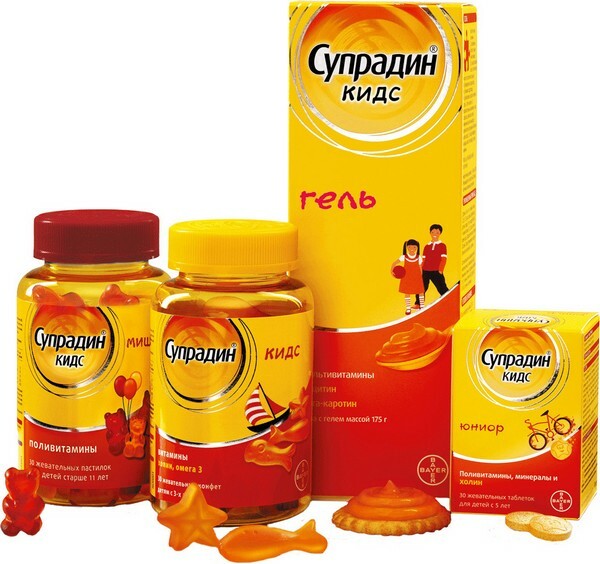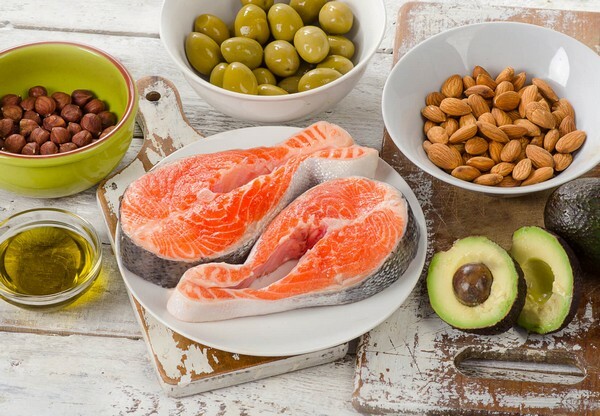- Useful properties of
- Daily norm of Omega-3
- How to choose the best remedy with Omega-3
- The main sources of Omega-3
- The danger of deficiency of Omega-3
- The harm of
Omega-3 for children is as important as vitamins,and microelements. Deficiency of these important bioactive compounds in the baby's body will cause a backlog in mental and physical development. Children whose diets are deficient in Omega-3 are prone to frequent recurrences of respiratory infections - sore throats, tracheitis, bronchitis. Pediatricians recommend that parents of constantly ill babies include in their daily menu greasy light-salted fish, leguminous vegetables, olive oil. It is these foods that contain the maximum amount of useful Omega-3 acids.

Useful properties of
In the process of growth and development of the child, its cells intensively divide. For this, the body, along with food products, must constantly receive not only lipids, proteins and carbohydrates, but also omega-3 fatty acids. These biologically active substances are the structural units of almost all cell membranes. Polyunsaturated fatty acids take a direct part in the synthesis of hormone-like organic compounds of prostaglandins. They regulate blood pressure, transmission of nerve impulses, contractile function of the heart muscle.
Sedentary lifestyle and commitment to fast food become the main causes of slagging the body at a very young age. Benefit-Omega 3 for children is the ability of bioactive substances to normalize metabolic processes, especially fat metabolism. Polyunsaturated acids are involved in the transport of useful cholesterol in the composition of low density lipoprotein complexes. They are quickly removed from the blood vessels, which positively affects the condition of the veins, arteries and capillaries.
Strengthening the immunity of
Omega-3 refers to organic compounds exhibiting anti-inflammatory activity. With their constant and complete intake of food increases the functional activity of the immune system. If the baby's body gets viruses, pathogenic fungi or allergic agents, antibodies, white blood cells, T-lymphocytes begin to be produced. A powerful immune response does not give microbes any chance of rapid growth and reproduction.
Interestingly: Omega-3 acids should account for about 1% of all nutrients that enter the body daily. Only in this case, a full-fledged formation of the immune, cardiovascular and digestive systems of the baby is possible.
Improved memory
The conducted studies have established why Omega-3 is useful for children - the use of fatty fish, olive oil avoids learning problems. Kids better remember and learn the material, are distinguished by diligence and diligence. They have better contact with their peers, they are not characterized by aggressiveness, impulsiveness, irritability, anxiety.
Thanks to polyunsaturated acids in young children, sleep stabilizes, sleep phases normalize. Regular use of products with Omega-3 helps adolescents avoid the depressive conditions inherent in this period of life. Such children are not characterized by increased anxiety, nervous excitability, excessive suspiciousness.

Daily norm of Omega-3
There is still no consensus among pediatricians, at what age can Omega-3 children be taken additionally. The main source of bioactive compounds is fish oil. This natural product in the form of a thick liquid with a pronounced taste and odor can be used from the age of two. And in case of acute deficiency of polyunsaturated acids and fat-soluble vitamins, admission in children from 12 months is allowed.
Advice: When buying fish oil in capsules, preference should be given to those supplements with an omega-3 concentration of at least 30% indicated on the packaging. This value guarantees the high quality of the drug.
The norm of Omega-3 for children varies depending not only on their age and weight, but also on the state of health. To a baby up to three years of fully grown and developed it is necessary to receive daily with food about 0.8-0.9 g of polyunsaturated fatty acids. This amount is gradually increasing and by four years the need for the child's body in Omega-3 acids is increasing to 1.2 g. Children, who lead an active lifestyle, engaged in heavy sports, need more bioactive compounds than their peers who spend their free time at the computer.
If the doctor has prescribed an additional intake of dietary supplements or vitamin complexes, then when buying it is worth considering that the capsules and pills can contain a different amount of Omega-3.Detailed information on daily and single doses is indicated in the annotation attached to the package. There is also a recommendation about the duration of the therapeutic course. In some cases, for example, with a total deficiency of Omega-3, the doctor may increase the duration of the medication.

. How to choose the best remedy with Omega-3
It is very good if a pediatrician when composing a therapeutic regimen includes a specific drug for children with polyunsaturated fatty acids. Because the doctor's recommendation to buy "anything with Omega-3" will put parents in front of a difficult choice. On the shelves of pharmacies there is a wide assortment of various syrups, capsules, chewing marmalade. Their cost varies significantly depending on the form of release of Omega-3 and the manufacturer.
Advice: When choosing a drug or dietary supplements for children for treatment and prevention, it is worthwhile to focus on their price. Means with Omega-3 fatty acids can not be cheap because they use high-quality raw materials and modern technological equipment.
Despite the fact that taking capsules with polyunsaturated fatty acids is allowed to children from 7 years old, many babies can not swallow a remedy even with a lot of water. A chewing marmalade or a thick syrup containing purified fish oil is suitable for such a child. When choosing a medicine, you should give preference to the one serving of which contains a daily dose of Omega-3 for children. Here is the list of the most popular and effective drugs with polyunsaturated fatty acids:
- Pikovit Omega-3.The medicine is made in the form of a syrup, which includes not only Omega-3, but also ergocalciferol, retinol, tocopherol, ascorbic acid and the most important vitamins of group B. It is used to strengthen the protective forces of children from the age of three;
- Multi-tabs Omega-3.The drug is available in the form of chewable capsules and syrup, can be used for treatment and prevention in children from the age of three. Multi-tabs Omega-3 contains Omega-3, fat-soluble and water-soluble vitamins. Packaging with syrup is completed with a special measuring spoon;
- Supradin KIDS with Omega-3.Chewing marmalade with fish oil is produced in different dosages depending on the age of the children. The composition of the medication includes essential polyunsaturated fatty acids - eicosapentaenoic and docosahexaenoic.
Virtually all drugs with omega-3, intended for children, contain flavors and colorants. In this way, producers try to mask a very specific taste and smell of fish oil. Unfortunately, this is not always possible. Many parents have to purchase more than one kind of medicines before the child agrees to drink syrup or chew marmalades.

. The main sources of Omega-3
For the physical and mental development of a child, polyunsaturated fatty acids are required daily. The highest concentration is found in the liver and muscle fibers of marine fish of the following species:
- sardine;
- mackerel;
- salmon;
- halibut;
- herring.
There are a lot of Omega-3s in vegetable oils - sesame, olive and linseed. Useful biologically active compounds are destroyed by prolonged heat treatment. Nutritionists recommend baking fish or letting it in a small amount of water. Replenish the supply of Omega-3 in the baby's body will allow the introduction into its diet of food of Bulgarian pepper, Brussels sprouts, avocado, beans, chickpeas, lentils. They are best used only in fresh form. Children like to eat nuts and seeds, so you can enrich their daily menu with peanuts, cashews, almonds - plant sources of polyunsaturated fatty acids.
Impressions and Recommendations: Oily fish do not like all kids, but they rarely give up shrimps and squid. In these seafood contains not only a lot of Omega-3, but also easily digestible proteins, carbohydrates, vitamins and trace elements.

Danger of Omega-3 deficiency
An unbalanced and unbalanced diet provokes a deficiency in the body of a baby Omega-3.Parents learn about this only when they visit a pediatrician, when they bring a child because of frequent colds, stunting or poor learning ability. In the process of setting a preliminary diagnosis, a doctor may suspect a deficiency of polyunsaturated fatty acids and fat-soluble vitamins. After making the necessary adjustments to the daily menu and additional intake of Omega-3 for children in capsules or syrup, the child catches up with the growth and development of their peers.
But often the deficiency of Omega-3 remains unnoticed. Poor performance at school or inability to do sports by moms and dads write off for soreness or heredity. In these cases, parents do not go to pediatricians in vain. It is possible that the problem is precisely the lack of Omega-3.What can indicate a lack of polyunsaturated fatty acids in the body:
- Frequent allergic reactions. With deficiency of Omega-3, the baby is diagnosed not only with urticaria and atopic dermatitis, but also with difficulties with their treatment. Skin pathologies persist for a long time even when using creams and ointments with glucocorticosteroids;
- Hyperactivity. Polyunsaturated acids take a direct part in innervation, so their lack becomes the cause of excessive motor activity, problems with concentration;
- Poor storage of the material read or heard. Omega-3 is a structural element of the cells of the central nervous system, including the brain. Their deficiency leads to a deterioration in the memory of the child.
All of the above pathologies, as well as respiratory, gastrointestinal and kidney diseases can be prevented by introducing into the diet of the baby foods with a high content of Omega-3.With a total shortage of bioactive compounds, pediatricians prescribe drugs or dietary supplements with fish oil.
Caution: Lack of polyunsaturated fatty acids may cause a decrease in visual acuity in the child, especially twilight. In this case it is very important to quickly replenish the reserves of Omega-3 in order to prevent irreversible violations.

Harm
Many mothers and dads ask pediatricians whether it is possible to give children omega-3 in the form of pharmacological drugs or dietary supplements. As a rule, such an additional method is very useful if the diet of children contains insufficient products with polyunsaturated fatty acids. But the choice of medicines should be approached with caution. Some children show an individual intolerance not only to the active ingredients, but also to the auxiliary components of syrups, capsules and chewing marmalades.
Contraindications
All parents want to strengthen the immunity of their children, prevent viral and bacterial infections with the help of useful Omega-3.But when diagnosing certain diseases, the use of these biologically active substances can harm the baby's health. To there acute and chronic pathologies are:
- tuberculosis in the active phase;
- ulcers, gastritis, which breaks the integrity of the mucous membranes of the gastrointestinal tract;
- liver and kidney disease;
- hypervitaminosis;
- poor assimilation of calcium and its accumulation in tissues;
- presence of sand or concrements in the kidneys, urinary or gallbladder;
- poor blood clotting.
Warning: Since most dietary supplements and preparations with omega-3 include fish oil, if the susceptibility to this natural product is increased, the child may experience an allergic reaction.
Overdose of
An overabundance of polyunsaturated fatty acids in the baby's body will be indicated by sudden dyspeptic disorders - nausea, lack of appetite, excessive gas production, diarrhea or constipation. In this case, you should immediately stop taking dietary supplements or complex vitamins and seek medical advice.
Recommendation: If the pediatrician has prescribed an additional intake of Omega-3 to a small child, then the parents should choose the medicine with the lowest content of flavors, dyes and preservatives.
